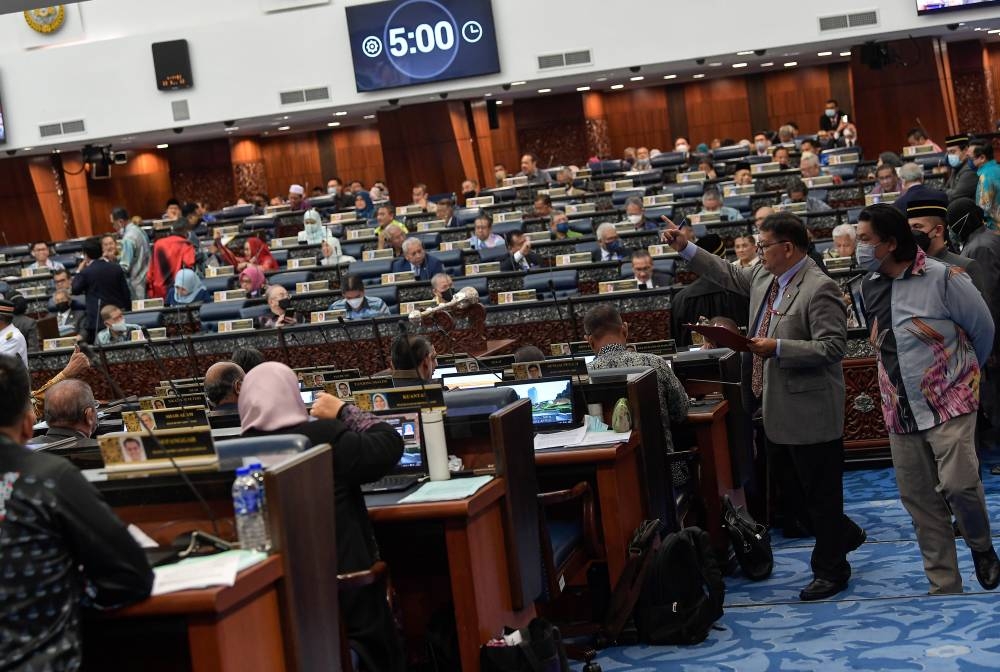JULY 29 ― Apple Inc’s co-founder Steve Jobs once shared in an interview with Business Week in 1998 that one of his mantras was focus and simplicity. He said:
“Simple can be harder than complex: you have to work hard to get your thinking clean to make it simple. But it's worth it in the end because once you get there, you can move mountains.”
I thought the above is reflected in the Constitution (Amendment)(No.3) Bill 2022 which made history when the Bill was passed unanimously by MPs present in the Dewan Rakyat yesterday.
A total of 209 MPs voted in favour of the Bill.

There were two leading views on the anti-party hopping law proposed to be introduced in the country. The first proposes that amendments be made to the Federal Constitution (Article 10 and 48 in particular) followed by a federal legislation on anti-party hopping. This should include “recall law.”
A strong proponent of the recall law is Pengerang MP Datuk Seri Azalina Othman Said. She asserted that the country should have recall elections if it was serious about ending the practice of elected representatives switching parties as and when they wished.
“Recall is the best remedy. Voters will decide if the elected representatives stay or go. Empower voters, NOT political parties, NOT government. That’s real democracy!” she posted on her Twitter account on April 10.
The second view considers that amendments to the Federal Constitution suffice. The amendments act as the constitutional enabler to rectify the precedent that anti-party hopping law contravenes Freedom of Association (Article 10).
One of the leading proponents of the view is senior lawyer Philip Koh Tong Ngee, who is also Adjunct Professor at the University of Malaya. According to Koh, the way forward is to have a constitutional amendment that is simple and concise.
“The simplicity and conciseness will obviate delay to the passage of Anti defection laws,” he wrote.
I have lent support to Koh’s view. What remained, however, was to define “political party.” The Societies Act 1966 has a definition of the term which can be adopted.
The Special Select Committee (SSC) duly considered the two views, but recommended what it calls a “one-step approach” ― that is, to amend the Federal Constitution without the need for an anti-hopping federal law. In its report to the Dewan Rakyat, the SSC states:
“Jawatankuasa bersetuju dan mengesyorkan agar diambil pendekatan satu langkah (one-step approach) dalam memperkenalkan undang-undang larangan bertukar parti, iaitu pindaan kepada Perlembagaan Persekutuan dan pada peringkat ini tidak memerlukan rang undang-undang yang khusus berkaitan larangan [Ahli Dewan Rakyat/Ahli Dewan Undangan Negeri] bertukar parti.”
It also states:
“Jawatankuasa bersetuju supaya takrif parti politik yang tepat dan boleh difahami diperuntukkan supaya ia dapat mencapai matlamat rang undang-undang ini dan mengelakkan sebarang kekeliruan dalam takrif ini.”
I must now join hands with Koh and the rest of the country in lauding the historic passage of the Bill into law. It is simplicity over complexity.
But as the late Steve Jobs said, simpler can be harder. The SSC must be commended for the hard work to get the simpler approach collectively agreed and reported to the Dewan Rakyat.
In the end, as Jobs rightly said, it has moved mountains. The Bill was passed and its passage in the upper house, the Dewan Negara awaits.
* This is the personal opinion of the writer or organisation and does not necessarily represent the views of Malay Mail.





















